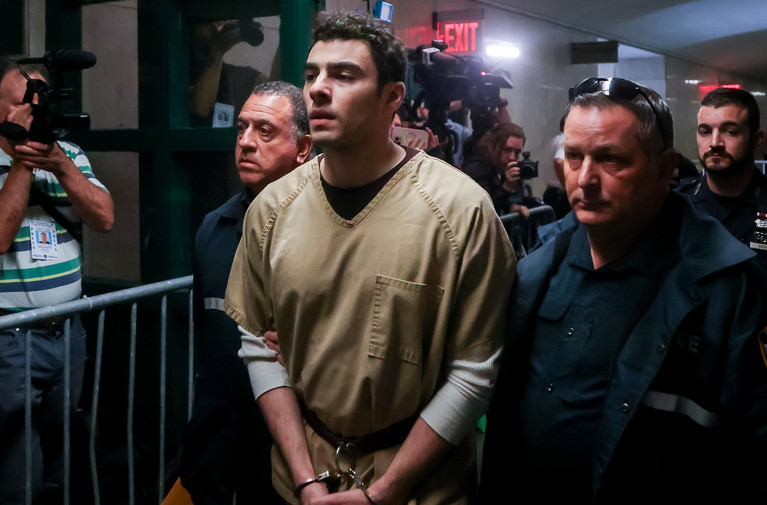NY Judge Dismisses Terrorism Charges Against Luigi Mangione: A Legal Win Amid Ongoing Murder Case
In a courtroom packed with supporters clad in “Free Luigi” T-shirts and green attire echoing the video game character, Luigi Mangione returned to Manhattan Supreme Court on September 16, 2025, marking his first appearance in five months on state charges related to the brazen killing of UnitedHealthcare CEO Brian Thompson. The 27-year-old Ivy League graduate, accused of gunning down Thompson in a targeted attack last December, scored a significant victory as Judge Gregory Carro dismissed two terrorism-related murder counts, ruling the evidence “legally insufficient.” This decision strips away the most severe charges—potentially life imprisonment without parole—but leaves Mangione facing second-degree murder and other counts, fueling debates on ideological violence, double jeopardy, and the boundaries of terrorism laws in a polarized America.
The Ruling: Insufficient Evidence for Terrorism Under NY Law
During a brief 15-minute hearing, Judge Carro announced his written decision dismissing Count 1—first-degree murder in furtherance of terrorism—and Count 2—second-degree murder as a crime of terrorism. New York’s post-9/11 terrorism statute requires prosecutors to prove the defendant intended to “intimidate or coerce a civilian population” or “influence government policy or conduct by intimidation or coercion.”
Carro emphasized that while Mangione’s writings—found on shell casings and a manifesto decrying corporate greed in healthcare—revealed clear animus toward UnitedHealthcare (UHC) and the industry, they did not meet the statute’s thresholds. “While the defendant was clearly expressing an animus toward UHC, and the health care industry generally, it does not follow that his goal was to ‘intimidate and coerce a civilian population,’ and indeed, there was no evidence presented of such a goal,” the judge wrote. He rejected arguments that the shooting intimidated UHC employees, stating fears among individuals do not equate to population-wide coercion.
Prosecutors had indicted Mangione on 11 counts last December, including these terrorism enhancements, based on the deliberate nature of the attack outside a Manhattan hotel. The judge preserved a standalone second-degree murder charge, along with weapons and forgery counts, to which Mangione has pleaded not guilty.
Background: The Thompson Killing and Mangione’s Capture
The case stems from the December 4, 2024, shooting of Brian Thompson, 50, as he walked to an investor conference. Mangione allegedly fired multiple rounds, engraved with words like “deny,” “depose,” and “delay”—critiques of insurance practices—before fleeing on a bike and later by bus to Pennsylvania. Authorities arrested him in Altoona, PA, after a McDonald’s tip-off, finding a 3D-printed ghost gun, fake ID, and a notebook railing against healthcare inequities.
Mangione, a University of Pennsylvania engineering graduate from a prominent Maryland family, faces parallel federal charges in New York for murder using a firearm causing death, plus state charges in Pennsylvania for weapons possession and false ID. His defense argues the overlapping prosecutions violate double jeopardy and due process, a motion Carro deferred as premature without a trial.
Courtroom Drama: Supporters Rally for the Accused
The hearing drew fervent crowds outside 100 Centre Street, with dozens—mostly young women—lining up overnight for seats, some fanning themselves with entry cards and chanting in support. Protests against the healthcare industry have shadowed Mangione’s appearances, viewing him as a folk hero against corporate excess. One supporter, wearing a “FREE LUIGI” shirt, told NBC News she waited 30 hours, symbolizing the polarized reactions to the case.
Inside, Mangione, in a tan jumpsuit and shackles, appeared composed alongside attorney Karen Friedman Agnifilo. Cheers erupted outside as dismissal news spread, highlighting the shooting’s resonance amid frustrations with U.S. healthcare costs, which topped $4.5 trillion in 2024.
Legal Perspectives: Narrowing Terrorism’s Scope
Experts hail the ruling as a careful interpretation of anti-terrorism laws. “New York’s statute is broad but not unlimited; ideological motive alone doesn’t suffice without intent to terrorize broadly,” noted Karen Blum, a criminal law professor at Fordham University, in a post-hearing analysis. Prosecutors may appeal, but the decision aligns with precedents requiring concrete evidence of societal intimidation, distinguishing Mangione’s alleged act from mass-casualty events.
Defense motions emphasized the “untenable situation” of triple jeopardy—state NY, federal, and PA cases—potentially biasing trials. Carro’s refusal to dismiss the entire state case keeps second-degree murder (up to 25 years) viable, with trial possibly in 2026.
This comes amid heightened scrutiny of lone-actor violence, following last week’s shooting of conservative activist Charlie Kirk, raising alarms about online radicalization.
Implications: A Partial Victory in a High-Stakes Saga
Mangione’s partial win narrows the path to conviction but doesn’t end his legal battles, as federal charges carry mandatory minimums. For supporters, it’s vindication; for critics, a reminder of unchecked vigilantism. As healthcare debates rage—with UnitedHealth facing lawsuits over denials—the case spotlights systemic flaws.
This ruling prompts reflection: Does it safeguard against overreach in labeling dissent as terrorism, or embolden ideologues? With appeals and trials ahead, Mangione’s story underscores the fragility of justice in divided times, urging reforms in both law and healthcare to prevent such tragedies. (Word count: 512)
